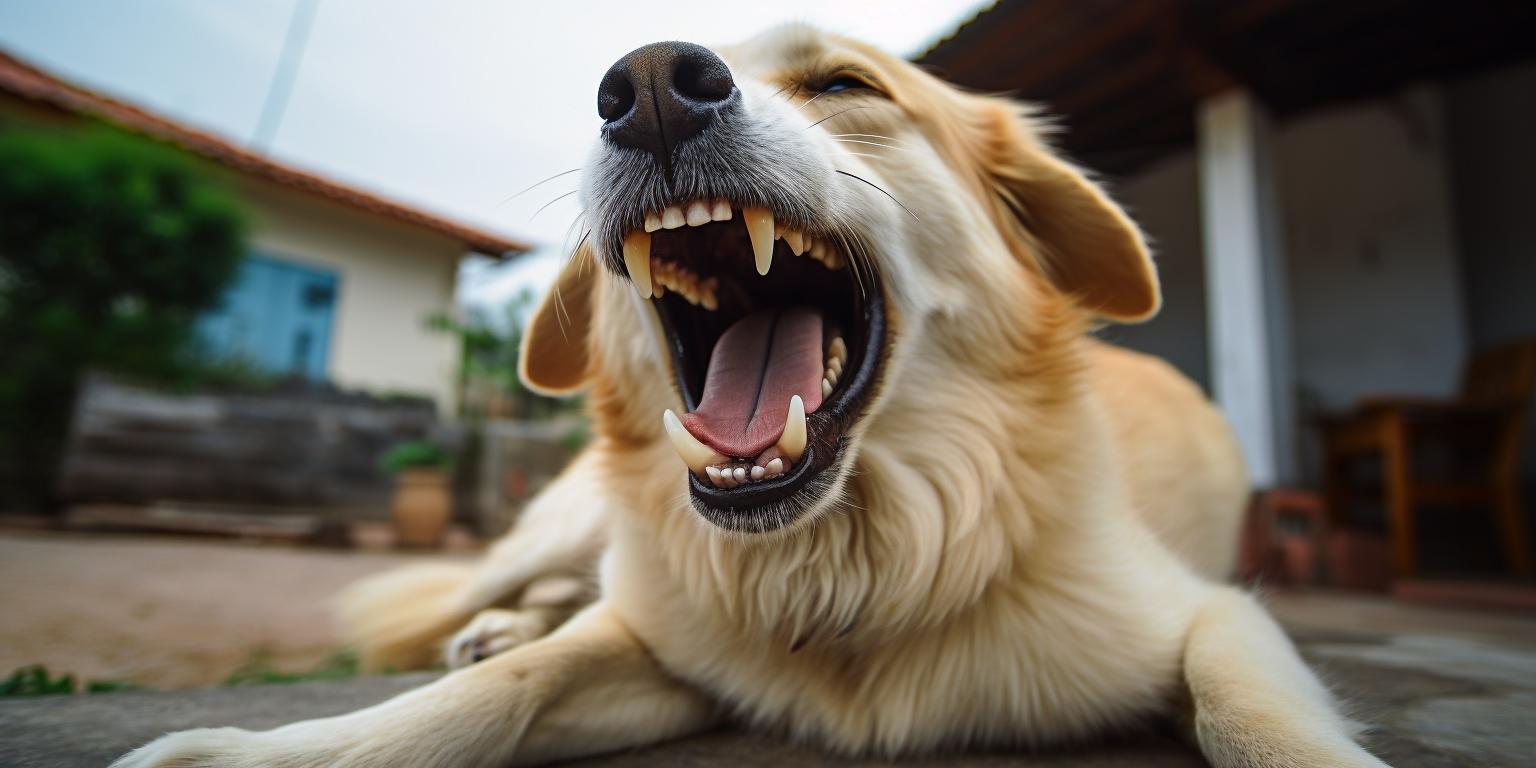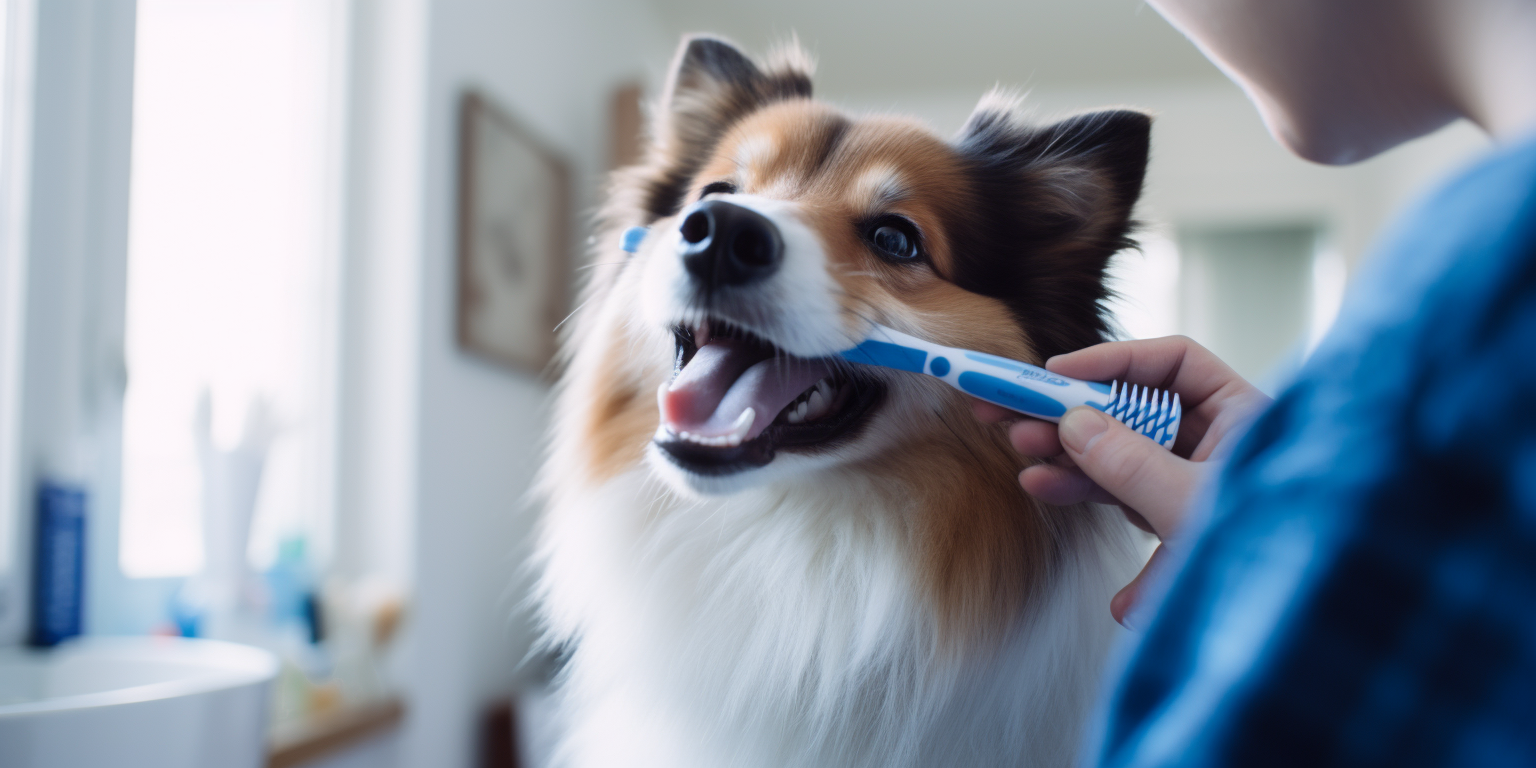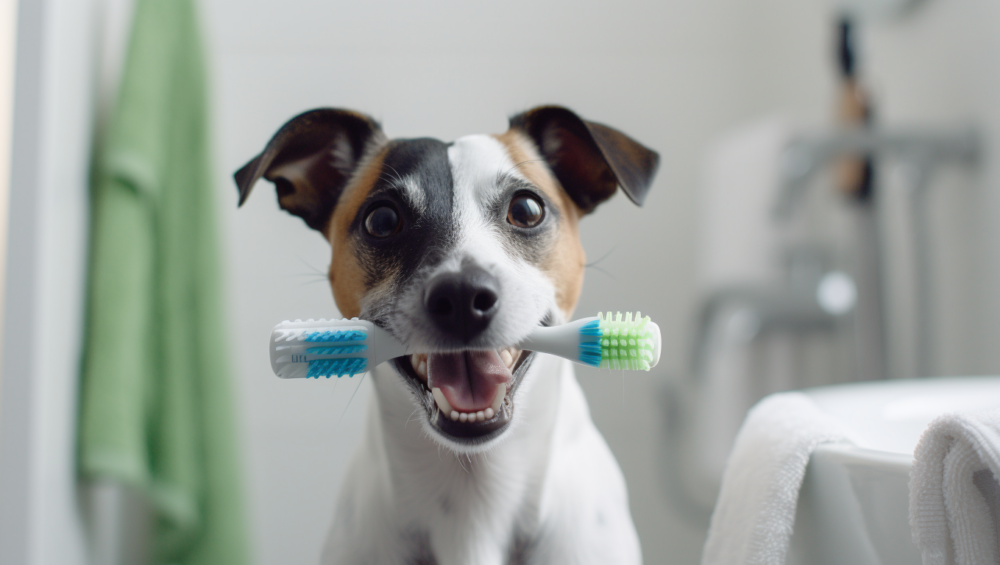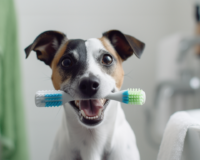Oral Care for Dogs: Recognizing and Treating Common Dental Issues
Taking care of your dog’s teeth is just as important as feeding them right and taking them for walks. Dogs can get toothaches and gum problems just like people do, and these issues can make them feel really bad. It’s important to keep their teeth clean to stop problems like plaque buildup, which can lead to even more serious health issues. This guide will help you understand how to take good care of your dog’s teeth, spot any dental problems they might have, and what you can do to fix them.
We’ll show you how to keep your dog’s mouth healthy, which can help them eat comfortably and stay happy. From learning about common dental problems to how to brush your dog’s teeth, and when to see the vet for professional cleaning, this guide has everything you need to know. Good oral care will not only keep your dog’s breath smelling fresh, but it will also keep them healthier overall. Let’s learn how to keep those doggy smiles bright and healthy!
The Importance of Oral Health in Dogs
Maintaining good oral hygiene is essential for your dog’s overall well-being. Just like for people, having clean and healthy teeth helps dogs feel their best. When a dog has good oral health, they can eat easily, play happily, and avoid painful mouth problems.
If a dog’s teeth aren’t taken care of, plaque can build up. Plaque is a sticky film of bacteria, and if it’s not cleaned off, it turns into tartar. Tartar is harder and can cause the gums to become red, swollen, and sore. This is called gingivitis. If gingivitis isn’t treated, it can turn into periodontal disease, which is a serious infection that can damage the gums and even the bones in the jaw.
Poor dental health doesn’t just affect the mouth. It has the potential to result in more severe health complications. The bacteria in the mouth can get into the bloodstream and spread to other parts of the body, like the heart and kidneys. This could potentially cause severe illness in your dog.
Taking care of your dog’s teeth includes brushing them regularly, giving them dental-friendly toys and treats, and having their teeth checked by a vet. This helps prevent bad breath, tooth loss, and can help your dog live a longer, healthier life. So, keeping your dog’s mouth clean is a big part of taking good care of your furry friend.

Common Dental Problems in Dogs
Dogs can have several common dental problems, just like people do. Knowing what these problems are can help you keep your dog’s teeth and gums healthy. Here are some of the dental issues that dogs often face:
- Plaque and Tartar Buildup: Plaque is a sticky layer that forms on teeth soon after eating. If it isn’t cleaned off, it hardens into tartar. Tartar is tough and sticks strongly to the teeth.Failure to remove it can result in gum disease.
- Gum Disease (Periodontal Disease): This is very common in dogs. It starts when the gums get inflamed (swollen) because of tartar and plaque. This disease can make the gums pull away from the teeth, creating gaps where infections can grow. If it gets worse, it can damage the bones that hold the teeth and lead to tooth loss.
- Tooth Decay and Cavities: Though not as common in dogs as in humans, dogs can get cavities. Cavities are holes in the teeth that can get bigger and deeper if they’re not treated, causing pain and tooth loss.
- Broken Teeth: Dogs love to chew, but chewing hard objects like certain toys or bones can break their teeth. Broken teeth are painful and can get infected.
Keeping an eye on these problems and taking steps to prevent them, like regular brushing and vet visits, can help your dog avoid pain and keep their teeth strong. If you notice any signs of these issues, like bad breath, not wanting to eat, or red gums, it’s important to see your vet. They can help treat your dog’s teeth and keep them healthy.
Signs of Dental Issues in Your Dog
It’s important to know the signs of dental issues in dogs so you can help them stay healthy. Here are some common signs that your dog might have a problem with their teeth or gums:
- Bad Breath: If your dog’s breath smells worse than usual, it might be a sign of dental problems.
- Trouble Eating: If your dog seems to have trouble chewing their food, eats only on one side of their mouth, or drops food while eating, it could be because they have a sore tooth.
- Pawing at the Mouth: Sometimes dogs will paw at their face or mouth if something hurts. If you see your dog doing this a lot, it might mean they have dental pain.
- Red or Swollen Gums: If your dog’s gums look red or swollen, or if they bleed easily, these are signs of gum disease.
- Loose or Missing Teeth: As dental problems get worse, your dog’s teeth may become loose or even fall out.
- Not Wanting to Play with Chew Toys: If your dog usually likes to chew toys but suddenly stops showing interest, it might be because their mouth hurts.
If you observe any of these indications, it’s advisable to bring your dog to the veterinarian. The vet can check your dog’s teeth and gums and help fix any problems. Ensuring your dog’s dental well-being is crucial for their overall happiness and wellness.

Preventing Dental Problems in Dogs
Preventing dental problems in dogs is very important and can save them from pain and other health issues. Here are some easy ways to help keep your dog’s teeth and gums healthy:
- Brush Their Teeth: Just like for people, brushing helps keep dogs’ teeth clean. Try to brush your dog’s teeth every day, or at least a few times a week. Use a toothbrush and toothpaste that are made just for dogs.
- Give Them the Right Food: Dry kibble is better for your dog’s teeth than soft food, because it helps scrape off plaque as they chew. There are also special dog foods designed to help clean teeth.
- Chew Toys and Dental Treats: Chew toys can help keep your dog’s teeth clean by scraping away soft tartar before it hardens into plaque. Dental treats are made to help reduce plaque and freshen breath.
- Regular Vet Visits: Take your dog to the vet regularly for check-ups. The vet can look at their teeth and clean them if needed.
- Keep an Eye on Their Mouth: Regularly look inside your dog’s mouth. Check for red gums, bad breath, or anything unusual. This way, you can catch problems early before they get worse.
By following these steps, you can help prevent dental problems and keep your dog’s mouth healthy. This means your dog can continue to eat, play, and live happily without dental pain.
Basic Dental Care at Home
Taking care of your dog’s teeth at home is a big part of keeping them healthy and can prevent painful dental problems. Here are some basic steps you can follow to help keep your dog’s teeth clean:
- Brushing Their Teeth: The best thing you can do for your dog’s dental health is to brush their teeth regularly. Use a toothbrush that’s made for dogs, and dog toothpaste (never use human toothpaste as it can be harmful to dogs). Start by letting your dog taste the toothpaste and get used to the brush. Gently lift their lips and brush their teeth and gums lightly. Try to do this a few times a week, or every day if you can.
- Dental Wipes: If your dog doesn’t like the toothbrush, you can use dental wipes instead. These are soft wipes that you can use to rub against your dog’s teeth to help remove plaque.
- Oral Rinses and Sprays: There are special rinses and sprays made for dogs that help kill bacteria in their mouth and freshen their breath. You can use these by spraying them in your dog’s mouth, following the instructions on the label.
- Healthy Diet: Feeding your dog crunchy kibble can help scrape plaque off their teeth. There are also prescription dental diets available that are specially made to reduce plaque and tartar build-up.
- Chew Toys and Dental Treats: Chew toys can help clean your dog’s teeth naturally as they play. Dental chews are treats made to help reduce tartar and improve breath. Choose safe, appropriate-sized toys and treats to avoid any choking risks.
By doing these simple care routines at home, you can help keep your dog’s teeth and gums healthy. This will make them happier and can prevent the need for more serious dental treatments later on. Always keep an eye on your dog’s dental health and consult your vet if you notice any problems.

Professional Dental Cleaning and Care
Professional dental cleaning is an important part of keeping your dog’s teeth healthy. Sometimes, brushing at home isn’t enough to keep dental problems away, and that’s where your vet can really help.
When you take your dog to the vet for a dental cleaning, here’s what usually happens:
- Check-Up: First, the vet checks your dog’s teeth and gums to see if there are any problems like gum disease or loose teeth.
- Anesthesia: Most of the time, dogs need to be put under anesthesia for dental cleaning. This means they are asleep during the cleaning, so they don’t feel scared or uncomfortable. It also allows the vet to clean their teeth more safely and thoroughly.
- Cleaning: The vet will use special tools to remove plaque and tartar from the teeth, both above and below the gum line. This is important because tartar under the gums can cause infections.
- Polishing: After cleaning, the vet polishes your dog’s teeth. This makes them smooth and helps prevent more plaque from sticking to them.
- Check for Problems: If the vet finds any serious problems, like bad infections or broken teeth, they might need to treat these issues, sometimes even removing bad teeth.
Taking your dog for professional dental cleanings can prevent serious dental diseases and help your dog stay healthy and happy. It’s a good idea to have these cleanings done regularly, as recommended by your vet.
Dental Treatments for Common Problems
When dogs have dental problems, there are different treatments that can help them feel better. Here’s a look at some common treatments for dental issues in dogs:
- Cleaning and Scaling: Just like humans, dogs need their teeth cleaned to remove plaque and tartar. This is usually done at the vet’s office under anesthesia. The vet uses special tools to clean the teeth thoroughly, both above and below the gum line.
- Extractions: Sometimes a tooth is too damaged or infected to be saved. In these cases, the vet might need to remove the tooth. This helps prevent the infection from spreading and makes sure your dog isn’t in pain.
- Medications: If your dog has an infection in their gums or around their teeth, the vet might prescribe antibiotics to help clear it up. Sometimes, they might also give medicine to help with pain or to reduce swelling.
- Special Diets: Some dogs might need special dog food that helps keep their teeth clean. These foods are designed to be harder to chew, which helps scrub the teeth as the dog eats. They aid in minimizing the accumulation of plaque and tartar.
- Dental Restorations: In some cases, vets can fix damaged teeth with fillings or crowns, just like a dentist does for people. This is more common if the tooth is important for the dog’s chewing.
By using these treatments, vets can help dogs with dental problems feel better and keep their mouths healthy. It’s important to follow your vet’s advice and bring your dog for regular check-ups to keep their teeth in good shape.
Conclusion
Taking good care of your dog’s teeth is very important for their health and happiness. Just like us, dogs can have toothaches and gum problems that make them uncomfortable. By brushing their teeth at home, giving them the right foods and treats, and taking them for regular check-ups and cleanings at the vet, you can help prevent these problems.
If your dog does have a dental issue, there are treatments that can help them feel better, like cleaning their teeth, giving them medicine, or even removing a bad tooth if needed. Always watch for signs like bad breath, trouble eating, or red gums, as these can tell you when your dog might have a tooth problem.
Remember, keeping your dog’s teeth clean not only helps them eat well and stay pain-free but also keeps them overall healthy. So, take a little time to care for your dog’s teeth—it’s a simple way to show them how much you love them.






6 Comments
Are chew toys really effective for dental health?
Yes, chew toys can help reduce plaque and tartar buildup by mechanically scraping the teeth as your dog chews. Just make sure the toys are durable and appropriate for your dog’s size.
Can I use human toothpaste for my dog?
No, you should always use toothpaste specifically formulated for dogs. Human toothpaste contains ingredients like xylitol, which is toxic to dogs.
Are chew toys really effective for dental health?
Yes, chew toys can help reduce plaque and tartar buildup by mechanically scraping the teeth as your dog chews. Just make sure the toys are durable and appropriate for your dog’s size.